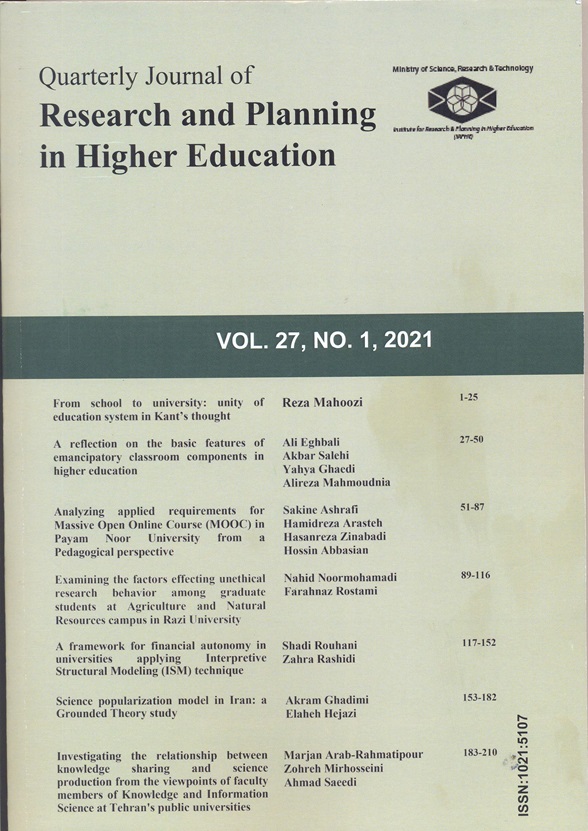From school to university: unity of education system in Kantâs thought
Author
Associate Professor in Philosophy, Institute for Social and Cultural Studies, Tehran, Iran
Abstract
Nowadays, the topics of the philosophy of education, in general, and the philosophy of university, in particular, are mainly focused on the details of the education system such as ethics, academic freedom, the relationship between education and developmental psychology and the like. This scenario, which is not unaffected by the prevailing discourse of recent decades, especially the discrediting of continental philosophy, on the one hand, and the opening of the field for sociologists, psychologists, and administrator in line with global development programs, on the other hand can confront us with the mental truths. But we must not forget that one day we would come across a much wider scope of the philosophy of education than the one we are facing now. The current paper, focusing on the philosophy of education of the eighteenth-century German philosopher Immanuel Kant, shows that this issue involves a continuous range from school to university. For him, this appropriate scope is an understanding of human anthropology and its purpose and includes future, cultural cohesion and the formation of a new society, universal moral ideals; these are the topics that determine the functions of education and educational mechanisms. In his two independent but consistent treatises, Kant bases this intertwined theory on an understanding of human history and the future based on the principles of his own critical philosophy, and shows the continuity of school and university in a manner consistent with the will of "nature" in functions and goals. By this way, since for Kant "nature" has wills and aspirations for freedom and enlightenment, he, in his two works, tries to explain the functions of the educational system from school to university in accordance with those aspirations and on the basis of enlightening and idealistic values; a patterns that requires empirical steps.
Keywords
2. Aquinas, T. (1952). The summa theological. Trans. by Fathers of English Dominican Province, Chicago: William Benton.
3. Berlin, A. (2006). The magus of the North: J.G. Hamann and the origins of modern irrationalism. Tran. by Reza Rezaie, Tehran: Mahi Publication [in Persian].
4. Boomer, F. (2006). Major currents in the history of Western thought. Trans.by Hosein Bashirieh, Tehran: Markaze Bazshenasi Eslam va Iran [in Persian].
5. Buchdahl, G. (1996). The relation between understanding and reason in the architectonic of Kant’s philosophy. Immanuel Kant, Critical Assessment, Vol. 4.
6. Elliot, R.K. (1996). The unity of Kant's critique of aesthetic judgment. in Immanuel Kant Critical Assessment, vol. 4.
7. Gonzalez, A.M. (2020). Culture, education and social theory. Trans. by Zohreh Saiedi and Reza Mahoozi, Kargadan Publication [in Persian].
8. Kant, I. (1800). Logic. Trans. by Robert S. Hartman, Wolfgang Schwartz, Amazon.
9. Kant, I. (1965). Critique of pure reason. Trans. by Norman Kemp Smith, Pressdin Macmillan.
10. Kant, I. (1979). The Conflict of the Faculties, translation and introduction by Mary J. Gregor, New York press.
11. Kant, I. (1990). Foundations of metaphysics of moral. Trans. by Hamid Enayat & Ali Gheysari, Kharazmi Publication [in Persian].
12. Kant, I. (1991). Prologomena. Trans. by Gholamali Hadad Adel, Markaze Nashre Daneshgahi [in Persian].
13. Kant, I. (2001). Perpetual peace. Trans. by Mohammad Saboori, Nashre Behbavaran [in Persian].
14. Kant, I. (2002). Critiqe of judgment. Trans. by Abdolkarim Rashidian, Nashre Ney [in Persian].
15. Kant, I. (2002). Critique of practical reason. Werner S. Pluhar. Hackett Publishing ompany, United States of America.
16. Kant, I. (2005). The growth of reason. Trans. by Manoochehr Sanie Darehbidi, Nashre Naghsho Negar [in Persian].
17. Kant, I. (2006). Critique of practical reason. Trans. by Enshallah Rahmati, Nashre Noorolsogholain [in Persian].
18. Kant, I. (2013). On the education. Trans. by Gholamhosein Shokoohi, University of Tehran Publication [in Persian].
19. Mahoozi, R. (2013). Supersensible in Kant’s thought. Metaphysics Magazine, Vol.15, University of Isfahan, Spring and Summer [in Persian].
20. Mahoozi, R. (2019). Kant’s philosophy of science. Publication of Institute for Social and Cultural Studies, Tehran [in Persian].
21. Moran, K.A. (2009). Can kant have an account of moral education? The Journal of Philosophy of Education, 43(4), 471-484.
22. Reath, A. (1996). Two conceptions of the highest good in Kant, in Immanuel Kant’s Critical Assessment, vol. 2.
23. Weithe Beck, L., (1984). A commentary on Kant's critique of practical reason. the University of Chicago Press, London.
 Quarterly Journal of Research and Planning in Higher Education
Quarterly Journal of Research and Planning in Higher Education
